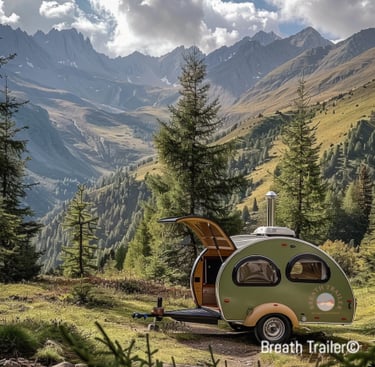Teardrop Trailers vs. Traditional RVs: Which is Right for You?
Choosing between a teardrop trailer and a traditional RV can be a tough decision for outdoor enthusiasts. Each option offers unique benefits and considerations. In this guide, we'll compare teardrop trailers and traditional RVs to help you decide which one suits your camping style and preferences.


Choosing between a teardrop trailer and a traditional RV can be a tough decision for outdoor enthusiasts. Each option offers unique benefits and considerations. In this guide, we'll compare teardrop trailers and traditional RVs to help you decide which one suits your camping style and preferences.
What is a Teardrop Trailer?
Teardrop trailers are compact, lightweight campers known for their streamlined design and minimalistic features. They typically include a sleeping area, storage space, and a basic kitchenette, making them ideal for solo travelers and couples seeking simplicity and mobility.
What is a Traditional RV?
Traditional RVs, also known as motorhomes or camper vans, come in various sizes and configurations. They offer more living space, amenities, and comfort features compared to teardrop trailers. RVs are suitable for larger groups or families looking for a home-like experience on the road.
Key Differences: Teardrop Trailers vs. Traditional RVs
1. Size and Maneuverability
Teardrop Trailers:
Compact and lightweight, easy to tow with smaller vehicles.
Maneuver easily in tight spaces and narrow roads.
Traditional RVs:
Larger and heavier, requiring a powerful vehicle for towing.
May be challenging to navigate in congested areas or narrow trails.
2. Comfort and Amenities
Teardrop Trailers:
Basic amenities like a cozy sleeping area and compact kitchenette.
Limited interior space but efficient layout for essential needs.
Traditional RVs:
Spacious living areas, multiple sleeping quarters, and full kitchen and bathroom facilities.
Ideal for longer trips or extended stays with amenities similar to a small apartment.
3. Cost and Affordability
Teardrop Trailers:
Generally more affordable upfront cost compared to traditional RVs.
Lower maintenance and operational costs due to simpler design and fewer amenities.
Traditional RVs:
Higher initial investment with varying costs depending on size and features.
Increased maintenance, fuel costs, and potential campground fees.
Choosing the Right Option for You
Considerations for Teardrop Trailers:
Ideal for solo travelers, couples, or small families seeking simplicity and mobility.
Perfect for weekend getaways, off-road adventures, and exploring remote destinations.
Considerations for Traditional RVs:
Suitable for larger groups or families needing more space and comfort amenities.
Best for extended road trips, full-time RV living, and campground stays with full hookups.
Conclusion
Choosing between a teardrop trailer and a traditional RV depends on your camping style, budget, and travel preferences. Whether you prioritize mobility and simplicity or comfort and amenities, both options offer unique benefits for outdoor adventures. Use this guide to make an informed decision and embark on your next camping journey with confidence.
